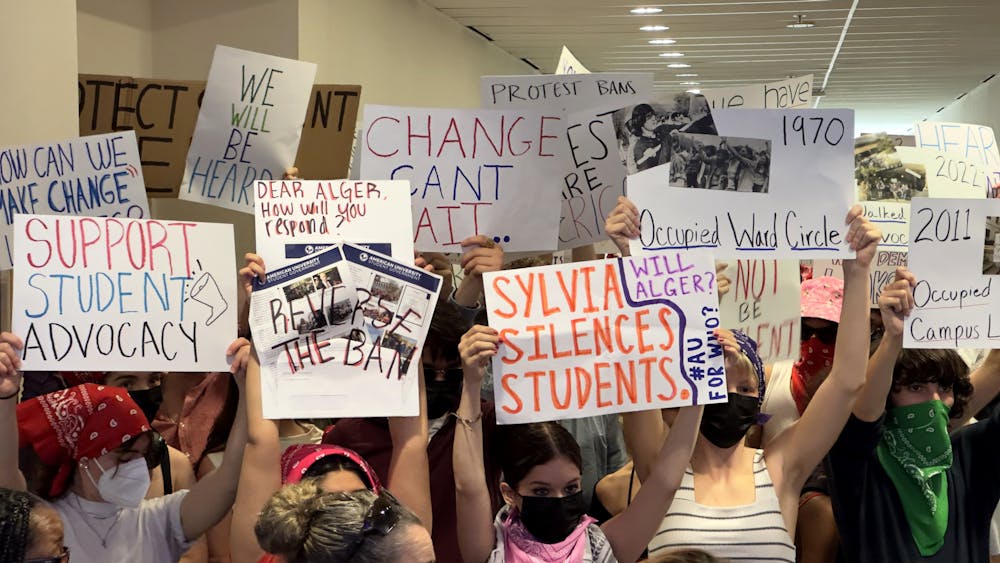From the Newsstands: This story appeared in The Eagle's December 2024 print edition. You can find the digital version here.
When American University President Jonathan Alger announced that the Jan. 25 directives were no longer in effect and University leadership would revise the expression policies, he shared that student feedback would play a vital role in shaping the policies. However, several student leaders expressed that their input still goes unheard.
“It’s incredibly frustrating to be told that your voice matters, especially as a student, and then have it be brought home that it does not matter,” said Grace Cosovich, President of the Sunrise Movement and a junior in the College of Arts and Sciences.
Former University President Sylvia Burwell put the Jan. 25 directives into effect to address “recent events and incidents on campus” that “made Jewish students feel unsafe and unwelcomed” and to “support a sense of belonging on campus.”
Burwell’s announcement came after the Louis D. Brandeis Center for Human Rights Under Law and Jewish On Campus filed a complaint with the U.S. Department of Education’s Office of Civil Rights asking them to investigate alleged violations of the Civil Rights Act of 1964.
Asher Heisten, a senator-at-large and sophomore in the School of Public Affairs, said Burwell’s announcement was “a complete blind side to [himself] and every single member of AUSG.”
During the 2024 spring semester, the administration faced criticism for the directives: SG held protests at Alger’s welcome reception and New Eagle Day, the University’s chapter of Students for Justice in Palestine delivered a letter to the President’s House demanding she protect student expression and the Foundation for Individual Rights and Expression sent a letter to the administration urging the revision of the policies.
“AU has a long history of protests and that is something that we need to protect,” Heisten said. “By introducing Alger to that on his first day at AU, I think he recognized that and recognized the power of it.”
In his announcement that the University would revise the policies, Alger wrote “free expression and the creation of a safe and welcoming community for all are bedrock principles” of the University.
Arusa Islam, president of SG and a senior in SPA, said she thought Alger’s “strong belief in free speech and making sure that students can express that” motivated him to change the directives.
Alger previously worked in the national office of the American Association of University Professors on issues of academic freedom and served in the Department of Education’s Office of Civil Rights, working on free expression.
Following Alger’s announcement, the administration hosted a forum for student feedback. At the forum, Vice President, General Counsel and Board Secretary Traevena Byrd explained that when the University drafts a new policy, they will allow a 10 day period to collect feedback from students.
At a Sept. 9 forum, Chief Financial Officer, Vice President and Treasurer Bronté Burleigh-Jones said the administration would select two students to serve as representatives on the Facilities Working Group, which previously consisted of only faculty and staff.
Owen Camferdam, co-chair of the Young Democratic Socialists of America and a junior in SPA, said “having student perspectives at the table is a step up” but that more representation is necessary.
Camferdam said the wording of the policies creates a “gray area where the University knows they can more or less act with impunity.”
Despite student pushback to the verbiage of the Social Media and Facilities Use policies, including a unanimous SG referendum calling for clarifications in the policy, the policies went into effect on Oct. 4.
“My concern in situations like [the Social Media and Facilities Use policies] is that there is no reason for administration to listen to student input,” Heisten said. “We don’t have the power to say no to a new policy.”
Cosovich said she was unsure of the new policies and didn’t see them in effect until SJP’s Oct. 7 vigil, during which several AU Police Department officers carrying zip ties stood on the quad near the attendees.
“With the way I’ve been seeing what’s happening to other student groups, especially SJP, I’m not really hopeful in the slightest that listening to student voices is something that [the administration] intends to carry out,” Cosovich said.
Heisten said the response to the vigil allowed students “to see some of the effects of what a restrictive policy can look like.”
“Enforcement is dependent on the type of space being used, and any violations of this policy may result in the termination or cancellation of events, denial of future use of university facilities, and disciplinary actions outlined in the student code of conduct,” said Elizabeth Deal, assistant vice president and deputy chief communications officer.
Cosovich said the Sunrise Movement faced pushback from the administration over the location of an Oct. 20 action outside of Bender Arena on Preview Day, including a meeting with University administration where they asked if Sunrise “could do [the action] a different day.”
Cosovich said since the administration did not state the planned action violated any rules. A few days later, Sunrise received an email from their faculty advisor, who was given suggestions from AU “about how to minimize [the action].”
Despite their concerns, several students expressed that the University’s actions created a more unified front amongst student groups.
“We’re only going to keep connecting with more groups because everybody’s getting frustrated by this,” Cosovich said. “It’s not just the groups that are the most outspoken that are affected by this. It’s every single group.”
This article was edited by Payton Anderson, Tyler Davis and Abigail Turner. Copy editing done by Luna Jinks, Emma Brown, Sabine Kanter-Huchting, Ariana Kavoossi, Ella Rousseau and Nicole Kariuki. Fact checking done by Sasha Dafkova and Hannah Paisley Zoulek.





